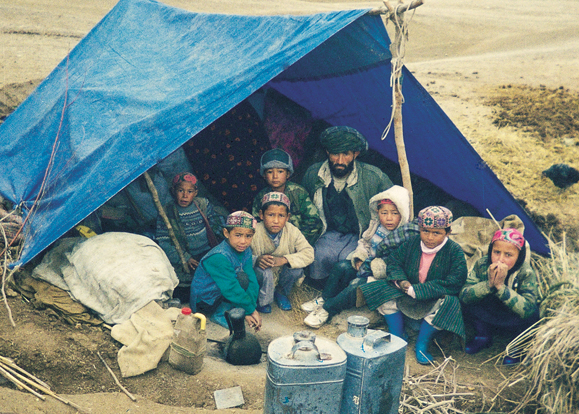“…We could see them [the Taliban soldiers] setting fire to houses on the hills around the village. We escaped before they captured our village. There were a lot of families, all running away from the Taliban. We all walked together until we got to Faizabad…To begin with we were given food by Concern and other people sometimes. But the food has run out and we haven’t received anything from anybody in a long time. We are all hungry…”
– Zeitun Ghulan Nabi, Afghanistan
℘℘℘
This is the account given by Zeitun Ghulan Nabi, an Afghani widow who lives with five of her children in one of the makeshift tents in a camp near Faizabad, in the Northern area of Afghanistan. Hers is one of millions of harrowing individual experiences of suffering and poverty brought about as a direct result of being displaced by conflict in Afghanistan.
Five years of Taliban rule and 20 years of civil war have brought misery and displacement to millions. However, this misery has been compounded by a series of natural disasters, such as the 1998 earthquake that killed 15,000 people, and by three successive years of drought and crop failure which have further reduced scarce food supplies. In addition, the onset of winter threatens an already weakened and malnourished population with cold and hypothermia.
Concern Worldwide, an international relief organization which was founded in Ireland in 1968 to provide humanitarian aid to the poorest and most needy regions in 26 countries across four continents, has had a presence in Afghanistan, ranked as the fifth poorest country in the world, since 1998. Concern has been based in Faizabad providing aid to about 170,000 Afghan refugees in aid camps.
The agents of the brutal terrorist attacks of September 11, in addition to the enormous suffering they caused in the U.S.A. have exposed the people of Afghanistan to yet further distress as people there attempt to escape from being caught up in the inevitable military response. At a time when humanitarian efforts should be expanding, they are instead being cut back in order to guarantee the safety of personnel. Prior to the September 11 attacks on the United States, Concern was already predicting famine in the region by mid-November, a situation which is deteriorating and becoming more acute with each passing day.
In late September, Concern’s expatriate workers, along with all other expatriate relief workers, were evacuated from Afghanistan when the Taliban announced that it could no longer guarantee their safety, leaving Concern’s relief efforts in Afghanistan in the hands of a dedicated local staff. However, the expatriate workers have not returned to Ireland. Instead, they have moved into neighboring Pakistan — to Islamabad, Peshawar, Quetta — as well as Dushanbe, the capital of Tajikistan, preparing for what could be a massive influx of refugees into these areas.
Niall Roche, Concern Worldwide’s Emergency Coordinator, has prior experience of being evacuated from Afghanistan. In 1998, Concern staff were given just 12 hours to pack up and get out in anticipation of the response to the 1998 bombing of the U.S. embassy in Nairobi. In early October, 2001, Roche and the assessment team of three Concern personnel arrived in Quetta in Pakistan where demonstrations against the anticipated military action against Afghanistan resulted in the deaths of a number of protesters. Against a background of high security, Concern is working to establish essential food and water supplies for the Afghan refugees. As the area has itself been severely affected by drought, a large part of relief efforts will involve the transportation of water to the region.
Concern’s priority is to get as much food as possible into Afghanistan within the areas in which it can still safely operate. It is extremely difficult to obtain accurate information on population movements in Taliban-controlled areas but clearly the figures involved are enormous. Since September 11, the UN estimates that the number of those dependent on food aid has risen from four million to seven million (out of a population of approximately 21 million). According to Dominic McSorley, a 20-year veteran of Concern’s emergency works, fear and hunger dominate much of the population — two factors that when combined will result inevitably in highly unpredictable population movements, making it even harder to plan effective relief efforts.
It is reassuring to know that relief efforts continue in Afghanistan to try to help the Afghan people just as efforts to return to a semblance of normality continue in the U.S. and, in particular, in New York and Washington. Ireland is one of 60 countries that suffered fatalities in the attacks upon the United States. The Irish-American community, a community with a long tradition of service in the police force and fire fighting department, sustained particularly heavy losses amongst the hundreds of rescue workers who died trying to save others when the Twin Towers collapsed. It is hopefully of some comfort to know that the same spirit of altruism and self-sacrifice exemplified by the victims of the terrorist atrocities in the U.S. is being continued by Irish and international relief workers in Afghanistan against a very different but no less horrifying landscape. ♦


Leave a Reply